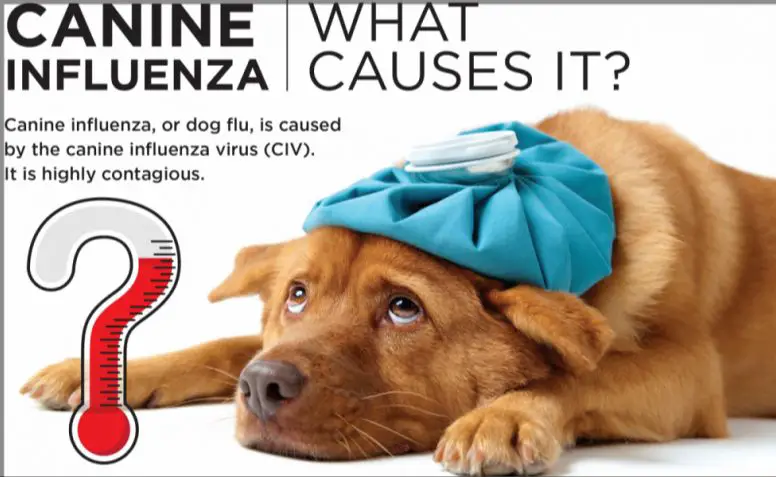Introduction
Just like humans, dogs can develop cold and flu-like illnesses that cause similar symptoms such as coughing, sneezing, runny nose, fever, lethargy, and loss of appetite. However, the common cold viruses that affect humans do not infect dogs. Instead, dogs can get illnesses like kennel cough or canine influenza that have overlapping symptoms with human colds and flu. While kennel cough is usually mild, canine influenza can potentially be more serious. Understanding the differences between these illnesses, how they spread, and what to do if a dog gets sick can help pet owners keep their furry friends happy and healthy.
Can Dogs Get Colds?
No, dogs cannot get human colds. However, dogs can contract infectious respiratory illnesses that have similar symptoms to the human cold. The most common respiratory infection in dogs is a contagious condition called canine infectious respiratory disease complex, more commonly known as kennel cough.
Kennel cough is an upper respiratory infection caused by bacterial and viral pathogens, including Bordetella bronchiseptica and canine parainfluenza virus. It is named kennel cough because it spreads quickly between dogs that are in close contact, like in kennels or shelters.
Kennel cough causes a dry, hacking cough that sounds like a honking goose. Other symptoms include sneezing, runny nose, eye discharge, lethargy, loss of appetite, and fever. Most dogs recover within a few weeks, but kennel cough can progress to pneumonia in rare cases.
So while the common cold virus doesn’t affect dogs, they are susceptible to their own respiratory illnesses. Kennel cough has similar symptoms to a human cold but is a distinctly canine condition.
Kennel Cough

Kennel cough, also known as canine infectious tracheobronchitis, is a highly contagious respiratory disease in dogs caused by both viral and bacterial pathogens. It got its name because it can quickly spread in places like kennels, animal shelters, dog daycares, and boarding facilities where dogs are in close proximity. Though most commonly spread through airborne exposure to the causative organisms from an infected dog’s cough, sneeze, or nasal discharge, kennel cough can also be transmitted by direct contact with contaminated surfaces.
Some of the most common pathogens involved include the bacteria Bordetella bronchiseptica and the parainfluenza virus. In some cases, secondary infections can also occur. The trachea and bronchi become inflamed, resulting in a harsh, hacking cough. Kennel cough often persists for 10-21 days, even with treatment.
Symptoms of kennel cough usually begin 4-10 days after exposure and include a forceful, persistent honking or hacking cough, possible fever, sneezing, gagging, loss of appetite, and nasal discharge. The cough may sound paroxysmal and end in gagging or retching. Most dogs will continue to remain alert and active despite the cough.
Kennel cough is usually self-limiting, but veterinary treatment can help alleviate symptoms, prevent secondary infections, and speed recovery. Antibiotics may be prescribed for bacterial infections while cough suppressants help control the cough. Ensuring rest, providing good hydration, and using humidifiers can also help soothe the irritated respiratory tract. Preventing spread of kennel cough involves isolating infected dogs, good hygiene, thorough cleaning of facilities, and vaccination.
Can Dogs Get the Flu?
Yes, dogs can get the flu. The specific illness is known as “canine influenza” and is caused by an influenza virus that is adapted to spreading efficiently between dogs. There are two main canine influenza viruses:
– H3N8 – this strain originated in horses and adapted to infect dogs as well. It was first detected in dogs in Florida in 2004.
– H3N2 – this strain is believed to have originated in birds in Asia. It emerged in dogs in the United States in 2015.
The symptoms of canine influenza are similar to that of the human flu. Dogs will exhibit coughing, runny nose and eyes, reduced appetite, and lethargy. Most dogs recover within 2-3 weeks.
There are some key differences between human and canine influenza viruses. Human flu viruses usually do not infect dogs, and vice versa. The incubation period is shorter for canine flu at 2-5 days compared to 1-4 days in humans. Dogs also tend to develop immunity after exposure to strains, while humans can get the flu multiple times.
Overall, canine influenza shares many similarities with human influenza but the viruses themselves tend to be species-specific. Proper prevention and vaccination are important to reduce transmission among dogs.
Canine Influenza

Canine influenza is a contagious respiratory disease caused by Type A influenza viruses. This flu infection mainly affects dogs, but some strains can also infect cats and other mammals. Just like human influenza viruses, canine flu viruses can mutate and produce new strains over time.
There are two known strains of canine influenza virus: H3N8 and H3N2. The H3N8 strain first emerged in horses and was first detected in dogs in Florida in 2004. It can spread through coughing, barking, sneezing, shared water bowls, interacting with infected dogs, or contact with contaminated objects. The symptoms of H3N8 are similar to kennel cough and can last up to 3 weeks. Most dogs will recover, but some may develop complications like pneumonia.
The H3N2 strain emerged more recently in 2015 after jumping species from birds to dogs. This strain is highly contagious and has rapidly spread across the U.S. The symptoms are more severe than H3N8 and can last 3-4 weeks. Dogs are more prone to developing pneumonia with this virus strain.
Treatment involves rest, plenty of fluids, and medications to relieve symptoms. Antibiotics may be prescribed if a secondary bacterial infection develops. Severely affected dogs may need hospitalization and oxygen therapy. Proper vaccination can help prevent dogs from contracting and spreading canine influenza viruses.
Transmission
There are several ways for dogs to contract kennel cough and canine influenza. The most common methods of transmission for both include:
- Airborne droplets – When an infected dog sneezes, coughs or barks, it releases virus particles into the air which can infect other dogs nearby.
- Direct contact – The viruses can spread through direct nose-to-nose contact between dogs, or by a healthy dog coming into contact with contaminants from an infected dog’s mouth, nose or eyes.
- Shared items – Viruses can live on surfaces like food bowls, water dishes, toys, bedding and kennel surfaces. When healthy dogs come into contact with contaminated objects, they risk infection.
- Boarding facilities and shelters – The viruses can spread rapidly in crowded indoor spaces where dogs are in close proximity. Proper sanitation and ventilation are essential in these facilities to prevent outbreaks.
- Dog parks and daycares – Any area where dogs congregate and interact poses a risk for transmission. Dog owners should be aware of signs of illness and keep sick pets at home.
Due to the highly contagious nature of kennel cough and canine influenza, preventative measures like vaccination are important to limit spread among dogs.
Prevention
There are a few key ways to help prevent your dog from getting colds, kennel cough, or canine influenza:
Vaccines

Getting your dog vaccinated is the best way to protect them against certain contagious respiratory illnesses. There are vaccines available for both kennel cough and canine influenza. Your veterinarian can help advise on the recommended vaccination schedule for your dog based on factors like age and risk level.
Avoid Shared Bowls and Facilities
Try to avoid letting your dog share food bowls, water bowls, or facilities like crates with other dogs. This can reduce the risk of spreading germs that lead to respiratory illness.
Limit Exposure When Sick
If your dog is showing signs of a respiratory illness, limit their contact with other dogs and shared facilities as much as possible to avoid transmitting the illness further.
Treatment
If a dog is diagnosed with kennel cough or canine influenza, treatment will focus on managing symptoms and preventing complications. As both illnesses are caused by viruses, antibiotics are ineffective unless there is a secondary bacterial infection present. The main aspects of treatment include:
-
Rest – Ensuring the dog gets plenty of rest is important, as their body needs to conserve energy to fight off the infection. This means restricting exercise and playtime.
-
Hydration – Keeping the dog well-hydrated with fresh water can help thin out mucus secretions and prevent dehydration from fever, vomiting, or diarrhea.
-
Antibiotics – If a bacterial infection is present, antibiotics may be prescribed. Common secondary infections include pneumonia or sinusitis. Antibiotics combat these concurrent bacterial infections.
-
Cough suppressants – Over-the-counter cough suppressants are not considered safe for dogs and should be avoided. If the cough is severe, prescription cough suppressants or sedatives may be given under a veterinarian’s supervision.
With supportive care at home and medication if needed, most dogs recover fully within 2-4 weeks. It’s important to isolate infected dogs during treatment to prevent spread to other pets.
Prognosis
The prognosis for dogs with kennel cough is generally good. Most cases will resolve on their own within 1-3 weeks, even without treatment. However, in some cases, especially where other infections are present, pneumonia can develop which requires antibiotic treatment.
With proper care and rest, most dogs fully recover from kennel cough without any lasting effects. However, reinfection is common since immunity only lasts 6-12 months.
The prognosis for canine influenza is more severe. Most dogs recover within 2-3 weeks, but the mortality rate is around 10% if pneumonia develops. Puppies, seniors, and dogs with other health conditions are most at risk. Proper treatment and care is essential for recovery.
Overall the prognosis is good for most dogs that contract kennel cough or canine influenza, especially with prompt veterinary attention. However, canine flu carries higher risks and dogs may take longer to regain full health and energy levels. Prevention and early treatment are key to ensuring the best outcome.
Conclusion

In summary, while the common cold virus does not affect dogs, there are some respiratory illnesses like kennel cough and canine influenza that have cold/flu-like symptoms. Kennel cough is usually a mild illness that is treatable with medication and rest. Canine influenza is more serious but also treatable. Prevention involves getting the proper vaccinations, avoiding interaction with infected dogs, and maintaining good sanitation. If a dog exhibits symptoms like coughing, sneezing, lethargy, fever, or discharge, take them to the vet right away for diagnosis and treatment. With proper care, dogs can recover well from these illnesses.
To prevent colds and flu in dogs, make sure they are up to date on bordetella and canine influenza vaccinations. Avoid dog parks or daycares where illnesses can spread. Sanitize food bowls, bedding, toys, and living spaces regularly. Pay attention for any symptoms of illness and schedule veterinary visits annually. Provide proper nutrition, exercise, and stress management. With attentive care and disease prevention, dog owners can help their pups stay happy and healthy for years to come.